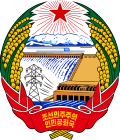 | |
North Korea | Pakistan |
|---|---|
Pakistan has both diplomatic and economic relationships with North Korea. The start of relations between the two countries emerged sometime in the 1970s during the democratic prime ministerialship of Prime Minister Zulfikar Ali Bhutto, when he made a state visit to North Korea as part of his foreign policy campaign to strengthen the relations with socialist states. Pakistan has an embassy in Pyongyang while North Korea maintains an embassy in Islamabad, a vast Consulate-General in Karachi, and consulates in other cities of Pakistan.
Contents
- History
- Iran–Iraq war
- Allegations of nuclear assistance by Pakistan
- Trade relations
- See also
- References
- External links
Pakistani public opinion towards North Korea seem to be largely divided, with 27% viewing it positively and 27% expressing a negative view. [1]
